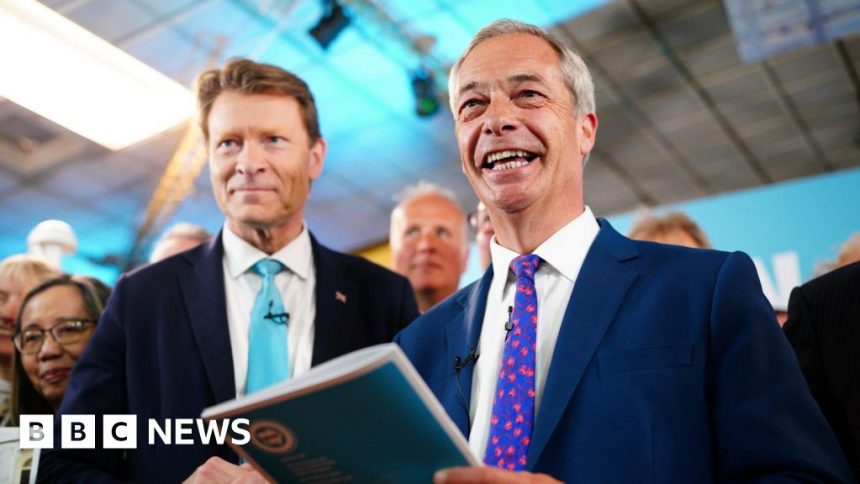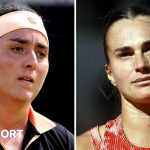Reform UK proposes ‘freeze’ on immigration
Nigel Farage has said the 2024 general election “should be the immigration election”, as he launched his party’s proposals in south Wales.
The Reform Party leader said he wanted to see a “freeze” on non-essential immigration, which he blamed for NHS waiting lists and the housing crisis, saying other parties “would rather not discuss it”.
Seeking to differentiate his plans from Labour and the Conservatives, he insisted the document he unveiled in the bar of a community centre in Gurnos, Merthyr Tydfil, was not a manifesto but a contract.
He said: “If I say to you ‘manifesto’ your immediate word association is ‘lie’.”
Eurosceptic Mr Farage was a member of the European Parliament for more than 20 years until the UK left the bloc in 2020 and also led the Brexit Party and UKIP before founding Reform.
“Guess who’s back,” he quipped as he took to the stage.
Immigration was the main focus of the event, with Mr Farage claiming “Britain is broken” and “in decline culturally”, and that stopping immigration would “help us at least try to catch up”.
Acknowledging that Reform was a “very, very new” political party, he said they were not aiming to form the government at this election but instead work towards a potential 2029 victory.
“Our ambition is to establish a bridgehead in Parliament, and to become a real opposition to a Labour government,” he said, adding the other parties were ineffective, with the Tories “split down the middle”.
Mr Farage repeatedly said he wants to create a “big, genuine mass movement of people” and “we need a good, strong opposition that can mobilise people in very large numbers”.
Five core pledges in the Reform UK manifesto include a freeze on “non-essential” immigration and the deportation of people crossing the Channel in small boats.
The party also believes “cutting back office waste” and giving tax breaks to doctors and nurses could lead to “zero” NHS waiting lists, and suggests axing income tax on earnings under £20,000.
Reform also wants to scrap Net Zero targets – aimed at tackling the climate crisis by minimising planet-warming gas emissions by 2050 – and instead turn to fossil fuels, with a promise to “unlock” the UK’s remaining oil and gas reserves.
The pledges also include leaving the European Convention on Human Rights.
Reform’s planned tax cuts would cost nearly £90bn per year, and spending increases would cost about £50bn per year, the party says.
To pay for this, the party claims there could be £150bn per year of savings in other spending, covering public services, debt interest and working-age benefits, including:
- Stopping the Bank of England paying interest to commercial banks on quantitative easing reserves, saving £35bn a year
- Cutting bureaucracy and improving efficiency – Reform says it will save £5 in every £100, worth £50bn a year
- Scrapping net zero, worth £30bn a year
- Cutting the foreign aid budget by 50%, saving £6bn a year
- Encouraging benefit claimants back to work, saving £15bn a year
However, Carl Emmerson, deputy director at the Institute for Fiscal Studies (IFS), said “the package as a whole is problematic”.
He said: “Even with the extremely optimistic assumptions about how much economic growth would increase, the sums in this manifesto do not add up.”
On paying for personal tax cuts by reducing the interest paid on Bank of England reserves, the IFS said the amount raised would be “much less than half” the figure estimated by Reform and “as ever there is no simple free lunch”.
Tax Policy Associates‘ Dan Neidle says Reform UK’s contract contains a total unfunded cost of at least £38bn.

- Live: Follow the latest news about the UK general election
- Poll tracker: How do parties compare?
- Voting: Who can I vote for in the general election?
- Reform’s rise: Polling guru John Curtice on this week’s figures
- General election 2024: All BBC stories and analysis
The candidates in Merthyr Tydfil and Aberdare are:
- Anthony Cole, Workers Party of Britain
- Bob Davenport, Communist Party of Britain
- David Griffin, Green
- Amanda Jenner, Conservative
- Gerald Jones, Labour
- Jade Smith, Liberal Democrats
- Gareth Thomas, Reform UK
- Francis Whitefoot, Plaid Cymru
- Lorenzo de Gregori, Independent







